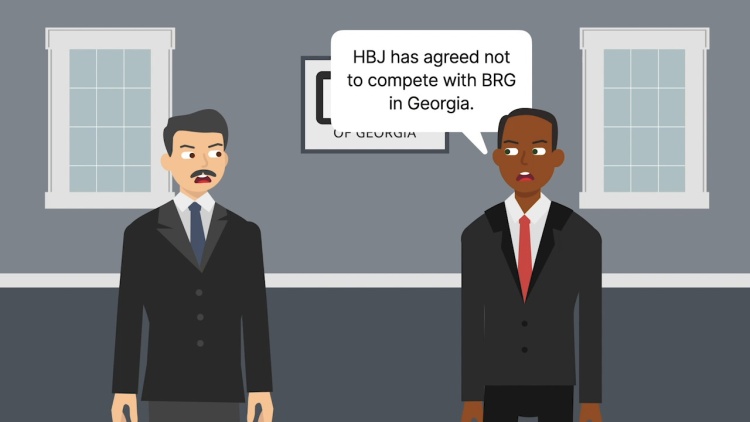Palmer v. BRG of Georgia, Inc.
United States Supreme Court
498 U.S. 46, 111 S.Ct. 401, 112 L.Ed.2d 349 (1990)
- Written by Tom Syverson, JD
Facts
During the period of 1977 to 1979, Harcourt Brace Jovanovich Legal and Professional Publications (HBJ) and BRG of Georgia, Inc. (BRG) (defendants) were direct competitors in the market for bar-review courses in the State of Georgia. In 1980, HBJ gave BRG an exclusive license to use HBJ’s content and trademark within Georgia. In exchange, BRG would give HBJ a share of BRG’s revenue and a fee of $100 per enrollee. As part of the agreement, HBJ agreed not to compete with BRG within Georgia, and BRG agreed not to compete with HBJ outside of Georgia. After entering into this agreement, BRG raised its price from $150 to $400. Palmer (plaintiff) sued BRG and HBJ, alleging that the agreement not to compete was a violation of § 1 of the Sherman Act, 15 U.S.C. § 1. The district court denied Palmer’s motion for partial summary judgment on the § 1 claim, holding that the agreement not to compete was lawful. The United States Court of Appeals for the Eleventh Circuit affirmed the district court’s decision. Palmer petitioned the United States Supreme Court for a writ of certiorari.
Rule of Law
Issue
Holding and Reasoning (Per curiam)
What to do next…
Here's why 904,000 law students have relied on our case briefs:
- Written by law professors and practitioners, not other law students. 47,100 briefs, keyed to 995 casebooks. Top-notch customer support.
- The right amount of information, includes the facts, issues, rule of law, holding and reasoning, and any concurrences and dissents.
- Access in your classes, works on your mobile and tablet. Massive library of related video lessons and high quality multiple-choice questions.
- Easy to use, uniform format for every case brief. Written in plain English, not in legalese. Our briefs summarize and simplify; they don’t just repeat the court’s language.





